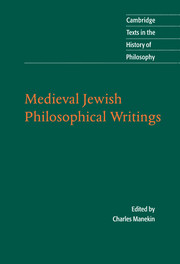Book contents
- Frontmatter
- Contents
- Introduction
- Chronology
- Further reading
- Note on the texts and translations
- 1 Saadia Gaon, from The Book of the Beliefs and Convictions
- 2 Solomon ibn Gabirol and Shem Tov b. Joseph Falaquera, Excerpts from “The Source of Life”
- 3 Moses Maimonides, from The Guide of the Perplexed
- 4 Isaac Albalag, from The Emendation of the “Opinions”
- 5 Moses of Narbonne (Narboni), The Treatise on Choice
- 6 Levi Gersonides, from The Wars of the Lord
- 7 Ḥasdai Crescas, from The Light of the Lord Treatise Two
- 8 Joseph Albo, from The Book of Principles
- Index
- CAMBRIDGE TEXTS IN THE HISTORY OF PHILOSOPHY
4 - Isaac Albalag, from The Emendation of the “Opinions”
Published online by Cambridge University Press: 05 June 2012
- Frontmatter
- Contents
- Introduction
- Chronology
- Further reading
- Note on the texts and translations
- 1 Saadia Gaon, from The Book of the Beliefs and Convictions
- 2 Solomon ibn Gabirol and Shem Tov b. Joseph Falaquera, Excerpts from “The Source of Life”
- 3 Moses Maimonides, from The Guide of the Perplexed
- 4 Isaac Albalag, from The Emendation of the “Opinions”
- 5 Moses of Narbonne (Narboni), The Treatise on Choice
- 6 Levi Gersonides, from The Wars of the Lord
- 7 Ḥasdai Crescas, from The Light of the Lord Treatise Two
- 8 Joseph Albo, from The Book of Principles
- Index
- CAMBRIDGE TEXTS IN THE HISTORY OF PHILOSOPHY
Summary
[On the knowability of future possibles]
49 The translator [Isaac Albalag] said: The possible is divided into many types that follow from the division of its causes into types. Therefore, one must examine if all the types are possible in the same sense in order to determine whether the foreknowledge of them all may be posited equally or not.
Let us begin by asserting that some of the causes of the possible are efficient and others are material, and both must join together for the realization of the possible effect. Furthermore, some of these efficient causes are natural; some are volitional; and others are accidental. Of the natural causes some causes maintain a knowable order – that is, their activity appears at known, ordered intervals and ceases in the same manner. Other [natural causes] maintain an order [that is unknown]. Of those causes that maintain an order, some can be prevented from acting by a volitional, unordered natural, or accidental hindrance, or can be prevented from receiving [a form] by a material hindrance, so that their effect does not appear at its customary time.
Others cannot be [so prevented]. This is certainly the case regarding a possible effect which, prior to its actualization, is necessitated to occur, such as the eclipse of the sun or the reappearance of the moon. For its cause does not require the assistance of a volitional or accidental cause, and a volitional, accidental or unordered natural hindrance cannot prevent it.
- Type
- Chapter
- Information
- Medieval Jewish Philosophical Writings , pp. 140 - 142Publisher: Cambridge University PressPrint publication year: 2008

